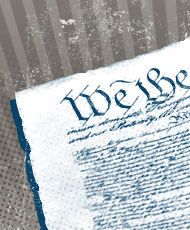Request For Amazon User Records Unconstitutional, Says ACLU

Group Will Join Lawsuit If North Carolina Department Of Revenue Keeps Up Demand For Private Information
FOR IMMEDIATE RELEASE
CONTACT: (212) 549-2666; media@aclu.org
RALEIGH, NC – The American Civil Liberties Union and the ACLU of North Carolina today sent a letter to North Carolina Secretary of Revenue Kenneth Lay reiterating concern over a recent request by the state Department of Revenue (NCDOR) for the private records of Amazon.com customers. The letter informs Lay that the ACLU will take legal action on behalf of North Carolina residents who are Amazon.com customers if NCDOR persists in its demand for their constitutionally protected private information. Specifically, the letter says the ACLU and its clients will intervene in an existing lawsuit brought by Amazon.com to stop NCDOR from collecting individually identifiable information that could be linked to specific purchases made on Amazon.com.
According to the lawsuit filed by Amazon in the Western District of Washington in April, NCDOR issued a request to Amazon for the purchase records since August 2003 of customers with a North Carolina shipping address in order to impose taxes on the purchases. Amazon has apparently already provided the NCDOR with product codes that reveal the exact items purchased – including books on the subjects of mental health, alcoholism and LGBT issues. Amazon has withheld individually identifiable user information, including names and addresses that could be linked back to the individual purchases, but asserts that the NCDOR continues to insist that such information be disclosed. In its letter today, the ACLU asserted that such disclosure would violate the constitutional rights of thousands of North Carolina consumers to read and purchase the lawful materials of their choice, free from government intrusion.
The following can be attributed to Aden Fine, staff attorney with the ACLU's Speech, Privacy and Technology Project:
"The Constitution guarantees Americans the right to read and buy the lawful materials of their choice without the government keeping tabs on the details of their purchases. Amazon was right to stand up for the rights of its customers and to refuse to turn over their personal information to the North Carolina Department of Revenue."
The following can be attributed to Jennifer Rudinger, Executive Director of the ACLU of North Carolina:
"The ACLU is not taking issue with the Department's authority to collect taxes on the value of these purchases, but there is no legitimate reason why government officials need to know which North Carolina residents are reading what books or purchasing which specific brands of products. We hope to be able to work out a satisfactory resolution to this matter so that consumers in North Carolina can rest assured that their privacy is protected."
The full text of the letter is below and online at: www.aclu.org/free-speech-technology-and-liberty/aclu-letter-north-carolina-department-revenue-secretary-kenneth-l
May 20, 2010
Via Facsimile
Secretary Kenneth Lay
North Carolina Department of Revenue
501 N. Wilmington St.
Raleigh, NC 27604
re: Amazon.com LLC v. Lay, 2:10-cv-00664 (W.D. Wash.)
Dear Secretary Lay:
We are writing to follow up on our fax dated April 21, 2010, regarding the Department of Revenue's request for private customer records concerning the items that North Carolina residents have received through Amazon.com. We write to inform you that we have clients — North Carolina residents who are Amazon customers and whose private records are at stake — who are gravely concerned about government access to their purchasing records. The information requested will reveal which North Carolina residents, including our clients, have received which specific books, movies, and other expressive and private items from Amazon. Our clients are prepared to intervene in the lawsuit in the Western District of Washington to protect their constitutional rights if necessary, but we write this letter in the hope that the Department might agree to a solution that would protect our clients' fundamental rights and avoid unnecessary litigation.
According to Amazon's lawsuit, the Department has issued information requests to Amazon that seek a broad set of information regarding all sales to customers with a North Carolina shipping address since August 2003. The Department has already received detailed data from Amazon about these purchases, including the specific product code for each purchase, which reveals the full description of each purchased item. These product descriptions reveal highly expressive and private information about consumer choices: for example, whether a person has received a book on alcoholism or home workshop weaponry, a movie like "Brokeback Mountain," or "sexual wellness" items such as sex toys.
Amazon appears to have turned over this detailed information already. We understand, based on press reports, that the Department is now taking the position that it does not want some of this information, such as the titles of books purchased, and that its information request did not seek to obtain such information. Amazon appears to dispute this account. We would appreciate receiving a copy of the information requests, redacted if necessary to protect taxpayer information, so that we could make an independent determination.
In any event, the fact remains that whatever the requests called for, the Department is now in possession of this highly sensitive and personal information, and if the Department persists in its demand that Amazon now additionally provide detailed user information, including names and addresses, the constitutional rights of our clients and tens of thousands of North Carolina consumers will be violated.
Moreover, merely limiting the request to the type of product purchased and not including the specific brand or title of the product would still reveal information about North Carolina residents –e.g., that they have purchased "condoms" or "yeast infection kits" – that the State is not permitted to collect. To the extent the Department believes it needs to learn what type of products were purchased, please explain why that specific information is necessary so that we can better understand the Department's position.
We want to reiterate that we are not challenging the Department's authority to impose a tax for these purchases or to conduct an audit. We are concerned, however, about the apparent breadth of the information requests, which sweep up constitutionally protected information that the Department does not need to determine tax liability. It is clearly established law that the Constitution forbids the government from collecting such information. See, e.g., In re Grand Jury Subpoena to Amazon.com, 246 F.R.D. 570, 572-73 (W.D. Wis. 2007); In re Grand Jury Subpoena to Kramerbooks & Afterwords, Inc., Nos. 98-MC-135-NHJ, 98-MC-138-NHJ, 26 Med. L. Rptr. 1599, 1600 (D.D.C. Apr. 6, 1998); Tattered Cover, Inc. v. City of Thornton, 44 P.3d 1044, 1052 (Colo. 2002).
As one court has already ruled in upholding the constitutional rights of Amazon customers against government intrusion into their expressive choices: "[I]f word were to spread over the Net—and it would—that the [government] had demanded and received Amazon's list of customers and their personal purchases, the chilling effect on expressive e-commerce would frost keyboards across America." In re Grand Jury Subpoena to Amazon.com, 246 F.R.D. at 573.
To ensure that our clients' and North Carolina consumers' constitutional rights are not violated, and to minimize the clear chilling effect from the Department's information requests, we respectfully ask that the Department:
- Destroy the records that it has already received from Amazon that reveal what products were purchased by North Carolina customers;
- Make a public statement acknowledging that it does not need records from Amazon or any other entity that reveal the specific products or the type of products that were purchased by each customer;
- Agree to take all necessary steps to change its existing policy and practice and to institute a new policy and practice to ensure that the Department does not issue overbroad information requests in the future to entities such as Amazon that call for the disclosure of constitutionally protected customer information, such as what products were purchased by each customer.
We have reason to believe that the Department has issued similar information requests to entities other than Amazon and that the Department has received similar customer information which is constitutionally protected in response. Please confirm whether that is correct. That the requests to Amazon are not the only such requests that have been made makes it all the more imperative that the Department cease issuing such overbroad requests that are sweeping in constitutionally protected information.
Please let us know how the Department wishes to proceed. If we do not hear back from you by May 28, 2010, our clients will be forced to intervene in this lawsuit to protect their rights. I will be out of the office for much of this week and all of the week of May 24, 2010, so please contact Aden Fine at (212) 549-2693 to discuss this matter further. We look forward to hearing from you shortly.
Sincerely,
Jennifer Rudinger
Executive Director
American Civil Liberties Union of North Carolina
P.O. Box 28004
Raleigh, NC 27611
Aden Fine
Mariko Hirose
American Civil Liberties Union Foundation
125 Broad Street, 18th Floor
New York, NY 10004
Related Documents
Stay Informed
Sign up to be the first to hear about how to take action.


